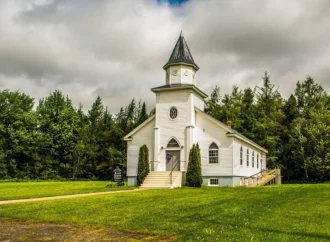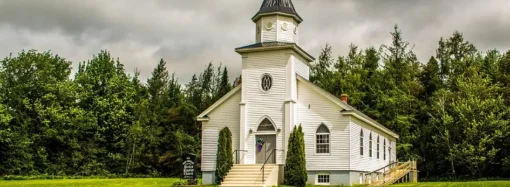The wonderful feeling of striking the ball just so and seeing it fly from your bat. The wind in your face as you fly around the bases. The giddiness of scoring the winning run for your hometown team as your friends and neighbors cheer you on. Baseball: America’s pastime, and one of the many ways in which Americans used to bond with one another.
In the 19th century, nearly every small town in the United States had their own club, a place for sporting gentlemen to bond and exercise. A team to which residents attached much civic pride as they cheered for their boys playing against those of the next town over.
There just doesn’t seem to be much that bonds Americans together anymore, an impression fortified by watching a few minutes of cable news coverage. When did we make the transition from identifying with the things we hold in common – such as hometown sports – to fighting over differences?
Peter Morris offers some insight as to how Americans used to bond in his book But Didn’t We Have Fun? Town ball clubs, Morris explains, enabled citizens to bond with local residents. Every match was a battle of honor between neighboring localities.
The intense emotions produced by these matches between neighboring towns had the important effect of translating the pride of belonging to a club into civic pride. A town’s ball club came not only to represent it on the ball field but to embody the hopes and dreams of the entire community.
Morris notes that while civic pride still exists in modern America, “it no longer carries the sense of urgency that it did in the mid-nineteenth century.” Part of the reason for this is that small cities and towns have absorbed one another and are no longer competing for residents. It’s a lot harder to know one’s neighbors, and the next town over isn’t considered so different anymore with the short amount of time it takes to get there.
In the 19th century, baseball was also a game for gentlemen who played for the love of the game. The sport was only beginning to take on the professionalism that we know today – a new feature that so many of that time’s players strenuously objected to.
Morris sums up the attitudes of mid-19th century players in this way:
Players strove to win ‘solely for the honor of victory’ that would accrue to their club, and played ‘as if the reputation of the club was at stake every time they met in the field.’ This led them to keep the spirit of competition within strict bounds—as already noted, early players very much wanted to win, but only if they could do so without in any way compromising the overriding concern of the club’s reputation.
The club meant something precious to its members—a sense of belonging not easy to put into words but perhaps best compared to what a patriot feels about his or her country, what a believer feels about his or her religion, or what all of us feel about our closest friends and family members. It was a deep bond, and letting something as trivial as the result of a baseball game interfere with it would have been unthinkable.
By comparison, today’s Americans find little pride in their community or their hometown team. Why should we, especially when we deprive ourselves of the chance to bond over common experiences and interests? Instead, we’re prone to label those who disagree with us on some point or another as different from ourselves.
Americans just don’t associate in the same ways we used to anymore. Church attendance and union membership are in decline. We willingly segment ourselves based on politics, religion, socio-economic status and all sorts of other metrics, while at the same time rejecting the sorts of ties that have bound societies together throughout human history. We aren’t even proud to be Americans anymore!
Gone are the days where the town and its local ball club provided so much identity and unity to residents. The question is, will anything ever replace it? Or are we doomed to listless factionalism and a lack of belonging in society?
—
[Image Credit: Wikimedia Commons-Author Unknown, public domain]
















Leave a Comment
Your email address will not be published. Required fields are marked with *